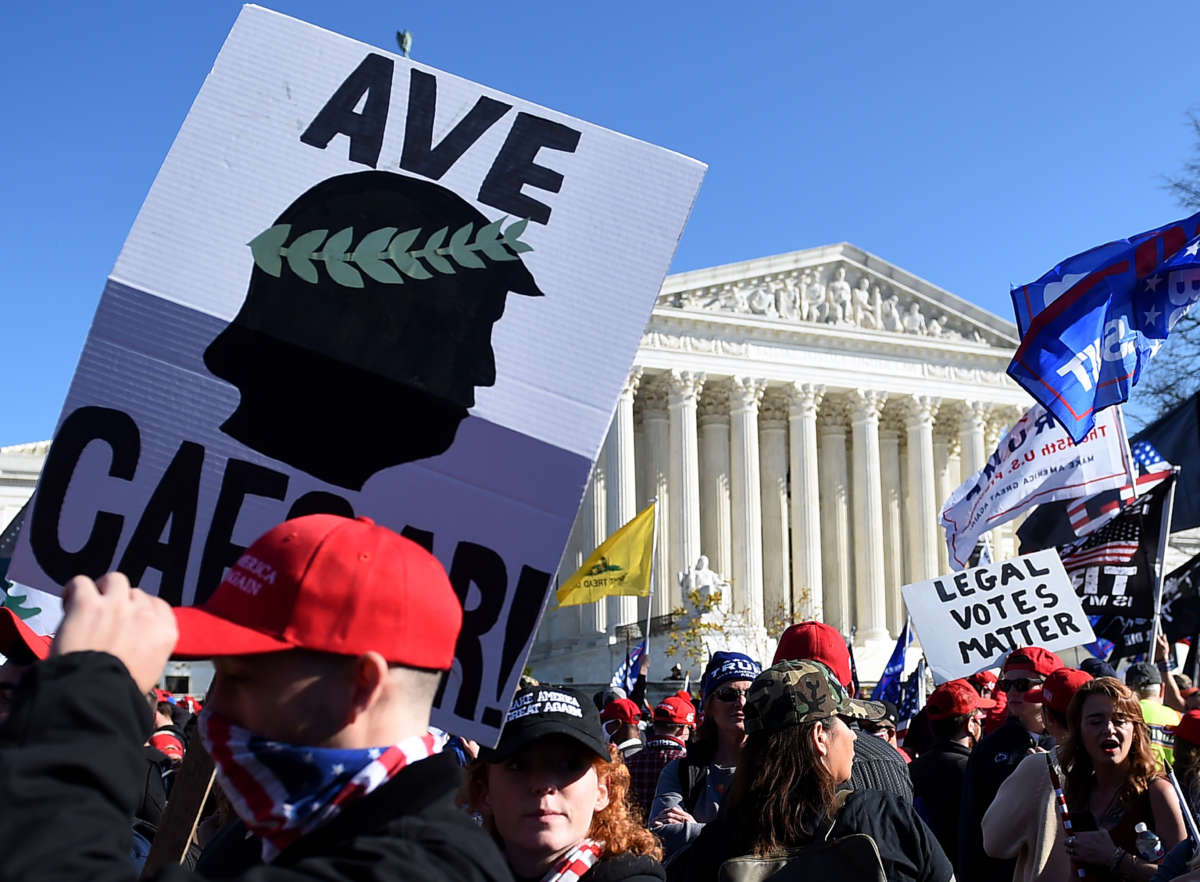
Supporters of President Trump rally at the Supreme Court in Washington, D.C., on November 14, 2020.OLIVIER DOULIERY / AFP VIA GETTY IMAGES
PUBLISHED December 10, 2020
If this whole grinding post-election drama is all just an elaborate troll on Donald Trump’s part, a fundraiser aimed at fleecing his base even as he “owns the libs” by keeping everyone constantly on edge, it is already a bleak masterpiece. The judiciary to date has served as guard rails for his nonsense quest to overturn the 2020 presidential election. Now that the 6-3 conservative Supreme Court has been roped into the affair for the second time in a week, however, we are all of a sudden playing with live ammunition and it ain’t so silly no more.
At about the same time as that court was swatting Pennsylvania’s ludicrous election-flip argument out of the building, the attorney general of Texas was serving up a new legal complaint so freighted with inadequacies that it bends the very light. AG Ken Paxton — himself under indictment — has brought directly to the high court a suit against the election results in Michigan, Pennsylvania, Wisconsin and Georgia, claiming that measures taken by these pivotal battleground states to allow voting during a pandemic invalidates the entire enterprise.
Mull that one a tick. A president whose crashing incompetence, negligence, vanity and fear allowed the COVID-19 pandemic to eat the country now has a minion arguing that the very basic and entirely legal steps taken to defend democracy against the calamity he caused are, in fact, illegal. More to the point, a “states rights” Texas Republican is asking that court to meddle in the most fundamental duties of the four named states.
Benjamin Ginsberg, the Darth Vader of Republican election lawyers, whose heavy hand held sway during the 2000 election recount fiasco, finds the entire premise almost unspeakably absurd. “I can’t imagine something that is less faithful to the principle of states’ rights than a Texas attorney general trying to tell other states how to run their elections,” he told CNN.
Paxton’s little SCOTUS enterprise is marred with flaws before you even open the complaint. No other court — state or federal — has been afforded a say on Paxton’s “arguments.” To accept the case on the merits, the justices would have to agree that the issues being presented cannot be resolved by any lower courts.
To say this is a leap is to call the Grand Canyon a pothole. “There’s nothing unique about Texas’ claims here, most of which have already been brought in other suits against the same four states,” University of Texas Law School professor Steve Vladeck informed CNN.
These are not the only logs in Trump’s road to the Supreme Court. As of today, all 50 states have certified the results of their votes from the 2020 presidential election. Those results now reside in a legal “safe harbor” which protects them from rogue states — and yes, we are now using that phrase to describe 17 different parts of this very country — attempting to overturn the will of the people. Now that this deadline has passed, it would be extraordinary and unprecedented for any court to intervene.
Not to be deterred by quaint legal notions like precedent and, well, bedrock legal principle, Republican governors from some 17 states — Alabama, Arkansas, Florida, Indiana, Kansas, Louisiana, Mississippi, Missouri, Montana, Nebraska, North Dakota, Oklahoma, South Carolina, South Dakota, Tennessee, Utah and West Virginia — have dogpiled Paxton’s petition. More importantly, Donald Trump has hitched his wagon to Paxton’s bleary star. On Wednesday, he asserted that Paxton’s case was “the big one” that “everyone has been waiting for.”The justices threw back his Pennsylvania petition this week without even deigning to comment, and a vast plurality of legal experts agree that something similar will take place with this Texas case.
In this, Trump is correct: Everyone is waiting to see what the high court will do. The justices threw back his Pennsylvania petition this week without even deigning to comment, and a vast plurality of legal experts agree that something similar will take place with this Texas case, the crowd of co-sponsors notwithstanding. It is a Hail Mary legal argument, lofted on a wing and a prayer in hopes that someone in the Supreme Court chamber will come down with the ball.
Thirty-six years ago nearly to the day, I was watching college football in a bad mood. Ronald Reagan had just been re-elected in a punishing landslide, and even in my youth I knew it was grim tidings. My household needed a smile, and the game that day gave us one: Boston College vs. Miami, the Hurricanes heavily favored over itty little BC and its bitty little quarterback, Doug Flutie.
It ended with Flutie dropping a towering last-second Hail Mary pass — “55 Flood Tip” was the play call — into the waiting arms of his roommate, Gerard Phelan, in one of the more preposterous endings in the history of organized sport. I lived a few blocks away from the BC campus, and when Phelan came down with that ball, the whole neighborhood — cars, trees, houses, sidewalks — leaped three feet into the air. It was a gloriously impossible ending that will live forever in college football lore.
This moment was special because Hail Mary passes only rarely work, and upon failure come to represent the desperation of the pass-tossing losing team in its defeat. Paxton, Trump and those 17 states have chucked up the mother of all Hail Mary passes toward the Supreme Court’s end zone. It seems highly implausible that the court will even agree to hear the case, much less choose to support the petition.
Here’s the thing, though: Phelan came down with the goddamn ball. Amid a forest of defending arms and in defiance of physics he came down with it and Boston College walked off the field that night a winner.
Trump has called a 55 Flood Tip, the ball is in the air, and if it all wasn’t strange enough already, Ted Cruz of all people has been tasked to go catch it. By all that is normal and true, this last-gasp pass should bounce harmlessly away, but 2020 has taught us a great deal about the power of the horrifically impossible to become flesh-and-bone real. We may hear the court’s decision as soon as tomorrow. Stay tuned, and stout hearts.

No comments:
Post a Comment